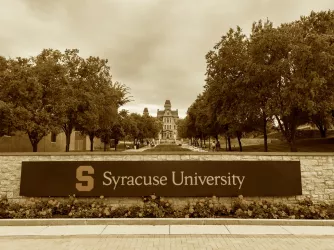Table of Contents
Supreme Court Agrees to Hear Hastings Law School Case; Right to Expressive Association on Campus Hangs in the Balance
Today, the Supreme Court of the United States granted certiorari in Christian Legal Society v. Martinez, an appeal of a March 2009 ruling by the United States Court of Appeals for the Ninth Circuit rejecting a Christian student group's constitutional challenge of the University of California at Hastings Law School's nondiscrimination policy. The Ninth Circuit's ruling acknowledged that the school's policy requires student groups to "accept all comers as voting members even if those individuals disagree with the mission of the group" in order to gain official recognition from the school, but held that these "conditions on recognition are therefore viewpoint neutral and reasonable." By agreeing to hear the case, the Supreme Court is now positioned to resolve a split in the circuit courts regarding the First Amendment right of student groups to engage in expressive association on our nation's public campuses.
FIRE will be filing an amicus curiae ("friend of the court") brief with the Court in support of the Christian Legal Society's appeal, asking the Court to continue its longstanding protection of expressive association.
Given the core First Amendment issues raised by Martinez and conflicting circuit opinions dealing with student groups and nondiscrimination clauses, FIRE is very pleased with the Court's decision. In the past several years, it has become very apparent that lower courts need guidance in deciding whether collegiate student groups enjoy a First Amendment right to require that leadership and voting members actually believe in the group's core tenets. For example, in Christian Legal Society v. Walker, 453 F.3d 853 (7th Cir. 2006), the Seventh Circuit held that Southern Illinois University's denial of recognition to the Christian Legal Society was likely a violation of the First Amendment. Noting that "[i]t would be difficult for CLS to sincerely and effectively convey a message of disapproval of certain types of conduct if, at the same time, it must accept members who engage in that conduct," the Seventh Circuit had "no difficulty concluding that SIU's application of its nondiscrimination policies in this way burdens CLS's ability to express its ideas." But the Ninth Circuit's decision in Martinez directly conflicts with the Seventh Circuit's opinion in Walker, deciding instead that because the nondiscrimination policy applied equally to all student groups, it was viewpoint neutral and thus constitutional.
FIRE asked the Court to address the split in the circuits and the tension between nondiscrimination policies and freedom of association on campus just this past April when we filed an amicus curiae brief with the Court in support of the petition to grant certiorari in the case of Truth v. Kent School District, 542 F.3d 634 (9th Cir. 2008)-a Ninth Circuit decision with facts that mirror those in Martinez, except that petitioner Truth was a high school student group. In our brief for Truth, we argued that the Ninth Circuit's decision had already begun to erode the expressive association rights of college student groups. As proof, we pointed to the Ninth Circuit's decision in the Hastings case, in which the Ninth Circuit's one-paragraph opinion relied solely on the Truth decision. We wrote:
The Ninth Circuit's holding in Truth has already negatively impacted expressive association on college campuses. Despite the fact that Truth arose in the high school context, the Ninth Circuit subsequently applied its decision and reasoning to the university setting. See Christian Legal Society Chapter of University of California v. Kane, No. 06-15956 (9th Cir. Mar. 17, 2009).
In Kane, a religious student group at the University of California at Hastings Law School challenged the school's nondiscrimination policy, which required all student groups to "accept all comers as voting members even if those individuals disagree with the mission of the group." Kane, No. 06-15956. The student group was denied official recognition because it required all voting members and officers to agree to a Statement of Faith. In a one-paragraph opinion, the Ninth Circuit upheld the law school's nondiscrimination requirement as "viewpoint neutral and reasonable," citing Truth as controlling precedent. Id.
Anticipating Kane, a district court in the Ninth Circuit applied the Truth decision to other religious student groups at the college level. Every Nation Campus Ministries v. Achtenberg, 2009 U.S. Dist. LEXIS 12251 (S.D. Cal. Feb. 6, 2009). Relying almost exclusively on Truth, the district court denied four religious groups at two California State University system schools the right to choose their members or leaders by reference to religious beliefs. Id. Repeating Truth's mistaken application of forum analysis, the district court held that "CSU may restrict access to its recognized student organization forum so long as the restrictions are viewpoint-neutral and reasonable in light of the purposes served." Id. at *48-49. Having determined that CSU's regulations were viewpoint-neutral and reasonable, following Truth, the court concluded that "CSU's nondiscrimination policy burdens Plaintiffs' expressive activity, if at all, only incidentally." Id. at *55.
Disappointingly, the Court declined to hear Truth on appeal this past June. However, today's grant of certiorari in Martinez means that the vital First Amendment issues raised in Truth will now be heard and resolved.
Martinez is possibly the most important case concerning FIRE's core issues to come before the Supreme Court in our decade of existence, and Torch readers will be hearing much more about it in the weeks and months to come. In the meantime, check out initial reactions from UCLA Law professor and noted blogger Eugene Volokh and Alliance Defense Fund Senior Counsel and former FIRE President David French.
Recent Articles
FIRE’s award-winning Newsdesk covers the free speech news you need to stay informed.

From the UK to Germany to Singapore: Police are watching what you post

Wisconsin school district mulls unconstitutional ‘hate speech’ policy

A cartoon, a mustache, and a witch hunt: The perils of bias reporting at Syracuse University
